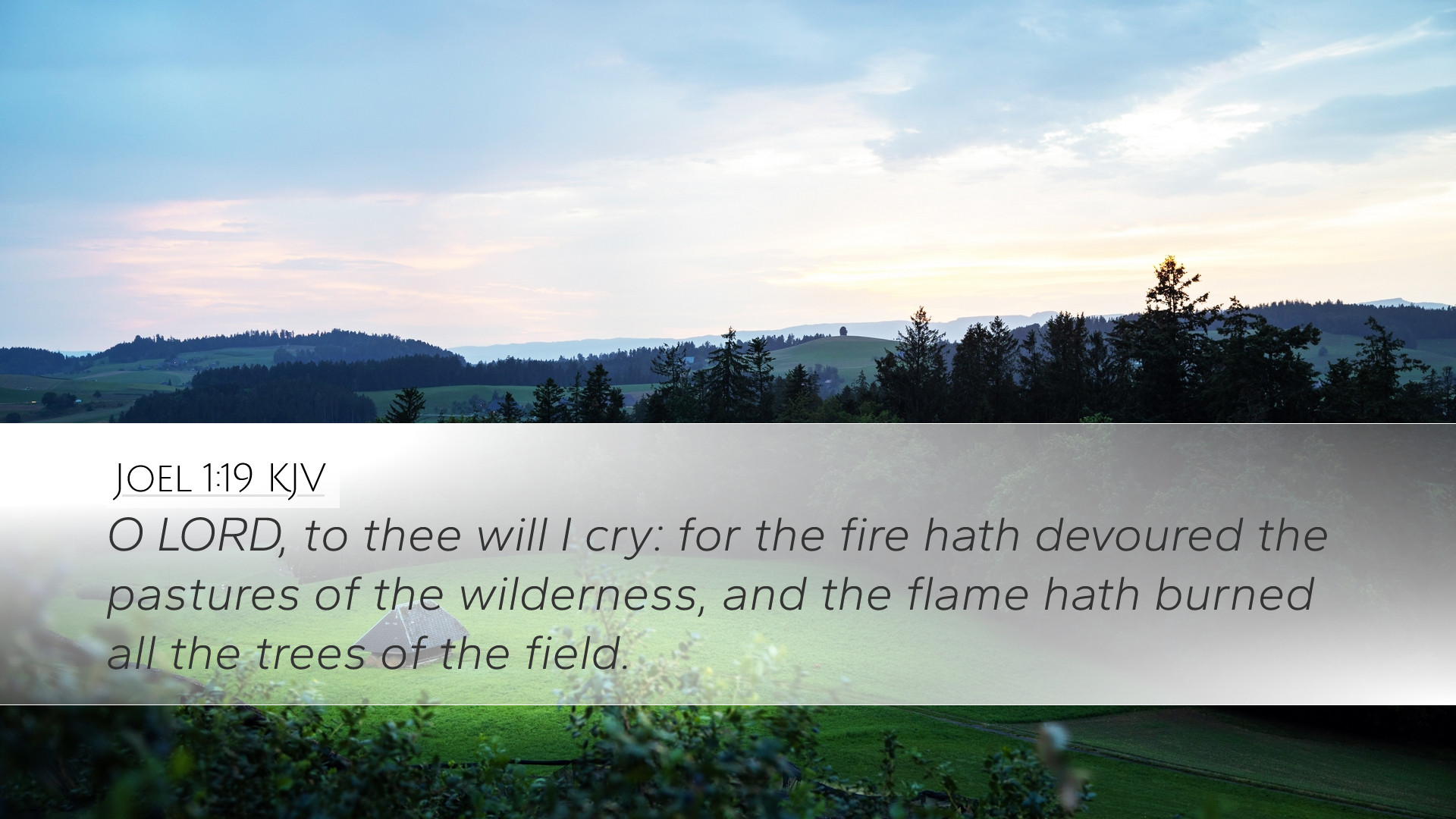Old Testament
Genesis Exodus Leviticus Numbers Deuteronomy Joshua Judges Ruth 1 Samuel 2 Samuel 1 Kings 2 Kings 1 Chronicles 2 Chronicles Ezra Nehemiah Esther Job Psalms Proverbs Ecclesiastes Song of Solomon Isaiah Jeremiah Lamentations Ezekiel Daniel Hosea Joel Amos Obadiah Jonah Micah Nahum Habakkuk Zephaniah Haggai Zechariah MalachiJoel 1:19
Joel 1:19 KJV
O LORD, to thee will I cry: for the fire hath devoured the pastures of the wilderness, and the flame hath burned all the trees of the field.
Joel 1:19 Bible Commentary
Bible Commentary on Joel 1:19
Verse Context: Joel 1:19 states, "O Lord, to thee will I cry: for the fire hath devoured the pastures of the wilderness, and the flame hath burned all the trees of the field." This verse is embedded in a lamentation concerning the devastation faced by the land of Judah due to a locust plague and a subsequent drought that led to widespread destruction.
Overview of the Book of Joel
Joel is a book located among the Minor Prophets of the Old Testament. Its primary themes include judgment, repentance, and restoration. Joel invokes a call to the people of Judah to respond to their dire circumstances through repentance and prayer. The prophet's vivid imagery warns of the consequences of sin while simultaneously offering hope for future restoration.
Exegesis and Interpretation
Matthew Henry's Commentary:
Matthew Henry emphasizes the desperation conveyed in this verse. The phrase "O Lord, to thee will I cry" reflects the human response to catastrophic events; it acknowledges that, amid destruction, the only source of hope is God. Henry interprets the "fire" and "flame" metaphorically, indicating both physical destruction and spiritual desolation ensuing from abandonment of God's ways. He cites the pastures and trees as symbols of life in communion with God, which are now suffering due to sin. Thus, he sets a paradigm: when facing calamity, true repentance begins with earnest prayer directed towards God.
Albert Barnes' Notes:
Barnes draws attention to the parallelism in the verse. The lamentation serves as both an acknowledgment of ruin and a petition for restoration. In elaborating on the specifics of the “fire” that has devoured, Barnes reflects on the locusts as agents of a fiery judgment. He emphasizes the urgency of the cry for mercy; it is a response to the realization that without divine intervention, there lies only desperation and desolation. Barnes considers the significance of communal cries directed to God, which reaffirm the need for collective repentance and a return to divine favor.
Adam Clarke's Commentary:
Clarke focuses on the characterization of God as the ultimate refuge in times of disaster. "To thee will I cry" signals an understanding that the cry itself is not just a plea for help but also an acknowledgment of God’s sovereignty over the land’s current plight. He interprets the elements of nature—the fire consuming the wilderness—as direct reflections of divine judgment due to Israel's idolatry and disconnect from God's covenant. Clarke highlights that the verse serves as a spiritual lesson about the consequences of turning away from God, thus advocating for restoration through divine mercy.
Theological Insights
- The Nature of Divine Judgment: The commentary by Henry and Barnes suggests that the natural phenomena—fire and devastation—represent God's judgment. This connects with a broader biblical theme where physical calamities often serve as metaphors for spiritual crises.
- The Role of Prayer in Crisis: Joel’s urgent cry signifies the necessity of prayer during times of anguish. It embodies a deep personal and communal reliance on God that is essential for healing and restoration.
- Restoration and Hope: Despite the dire circumstances, the context of prayer implies a turning back to God can lead to redemption. This hopeful outlook is foundational in Judeo-Christian theology, emphasizing that sincerity in repentance can compel divine action.
- Community and Leadership: The communal aspect of Joel’s message calls attention to the leadership’s role in guiding the people toward repentance. The collective cries mirror the action of communal worship and acknowledgment of shared sinfulness.
Applications for Contemporary Readers
This verse along with the surrounding context offers several applicable lessons for modern audiences:
- Repentance as a Community: Just as Joel called the people to collectively seek the Lord amidst calamity, today’s churches must recognize the importance of community repentance and seeking God in prayer.
- Acknowledgment of God’s Sovereignty: In a world filled with chaos and uncertainty, recognizing that the ultimate outcome lies in God’s hands is crucial for both individual faith and corporate trust.
- The Call to Action: The call to "cry" signifies that action often accompanies genuine faith. In battling spiritual apathy and despair, believers are encouraged to actively engage in prayer and seek restoration.
Conclusion
Joel 1:19 serves as a poignant reminder of the interplay between human suffering, sin, and divine mercy. Through the insights of Matthew Henry, Albert Barnes, and Adam Clarke, we glean a rich tapestry of understanding urging us toward genuine repentance and an earnest call to God. In the face of our own trials, we are reminded that the path to healing begins with an authentic cry to our Creator for help and restoration.


